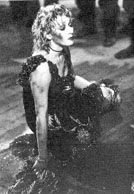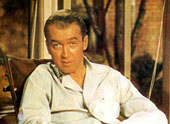![]()
As James Stewart has only recently died (July 1997), I decided to revisit one of his classic westerns, Destry Rides Again, in which the tall, gangling, mild mannered hero is teamed in what appears on the surface as a most unlikely pairing with sophisticated and sexy screen siren Marlene Dietrich. She plays Frenchy, saloon owner and showgirl to his Tom Destry, the new deputy sheriff of the wild west town of Bottle Neck.
She drinks neat whisky. He drinks milk. She shoots and fights with the best of them. He is a pacificist who refuses to carry a gun. She thinks breakfast time is late afternoon, wears thick makeup at all times, is perfectly coiffed (how does she do that in the old west?), and gets around in a fetching array of negligees and sparkly short frocks that show off her great legs.  He tells her there's probably a great-looking and decent woman hiding under all that makeup. He drenches her with water to stop a saloon catfight with an angry wife whose husband she has entrapped. She retaliates by throwing everything that isn't nailed down at him. And in the end, she is so won over by his quiet charm, sheer goodness and honesty that she takes a bullet for him and dies, thus ensuring that no code of morality is offended, and allowing Destry the prospect of marriage to a sweet girl who is pure of heart, but hasn't one hundredth of the personality of Frenchy.
He tells her there's probably a great-looking and decent woman hiding under all that makeup. He drenches her with water to stop a saloon catfight with an angry wife whose husband she has entrapped. She retaliates by throwing everything that isn't nailed down at him. And in the end, she is so won over by his quiet charm, sheer goodness and honesty that she takes a bullet for him and dies, thus ensuring that no code of morality is offended, and allowing Destry the prospect of marriage to a sweet girl who is pure of heart, but hasn't one hundredth of the personality of Frenchy.
As a film, Destry Rides Again holds up very well indeed. It is a classic Hollywood western, featuring the "usual suspects" in terms of stock characters. But they are all well observed, a credit to the genre. Dietrich does a marvellous turn as Frenchy, the hellcat with a heart of gold.
But the true heart of the film is James Stewart. He gives a typically understated performance as a genuinely good man - in one sense, no stretch for him at all. Destry is unfazed when the town heavy (Brian Donlevy) approaches him at the saloon bar, and demands that he hand over his gun. Having provoked the other man by saying he can't do that, he demonstrates by lifting his coat that it is simply because he doesn't carry a gun. Which is just as well, he points out, because if he did have one, somebody might have got hurt, and "it might have been me, and I wouldn't like that." You know that, whatever the first impressions of the locals, this man is anything but a coward, but in a genre where shoot outs and macho deeds predominate, it is so refreshing to meet a hero like Tom Destry, who uses words and his wits to survive. His speciality is spinning yarns. He has a 'friend' with a similar problem for every eventuality, and these simple, homespun tales mask his sharp wits and get him out of trouble.
Stewart can play comedy, too, with a straight face. When he arrives on the stage coach in Bottle Neck, none of the welcoming committee recognise him - they approach another man, who looks the part. Meanwhile, gentleman Destry is helping a lady from the stage coach, and just happens to be identified at the exact moment when he is holding her frilly parasol and her birdcage. A lovely moment, which Stewart pulls off with aplomb.
He is similarly identified as 'feminine' and therefore useless in an early bar room scene, where Frenchy mocks him by handing him a bucket and a mop, and telling him if he wants to clean up the town, he can start by washing the saloon floor. Stewart's Destry takes this absolutely in good part. He is not phased in the slightest by Frenchy's insult, or by the mocking laughter of the men in the bar. He just smiles and nods and goes along with the joke, which of course reduces its power to hurt.
In the '90s, it is conceivable that someone like Bruce Willis, who specialises in "Everyman" action heroes, would behave similarly for a moment or two, and then, when he has everyone lulled into a false sense of security, would whip out the hidden pistols or let fly with his fists. In Maverick, Mel Gibson plays the buffoon while it suits him, but then proves he can do the hero macho stuff. Even in the 1960s, in Butch Cassidy and the Sundance Kid, the film that started the trend for smart ass, wisecracking heroes that Gibson and Willis conform to, Butch (Paul Newman) may play mild mannered when it suits him, but he has a crazy partner Sundance (Robert Redford) to deal out the punishment for him.
James Stewart never needed any of that. His goodness shines through, and genuinely makes you want to believe that nice guys can win against any odds as long as they also have wisdom, integrity, a sense of humour, and a sure sense of who they really are.
He will be missed.

Stewart as incapacitated photographer L. B. Jeffries in Hitchcock's Rear Window(1954), one of his many great roles.
![]()